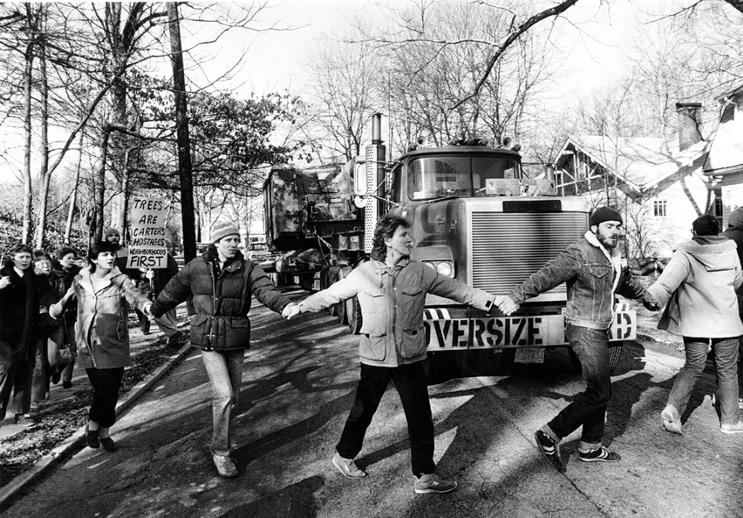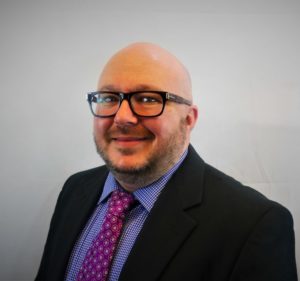COLE THALER | July 25, 2018
We need lawyers to defend our communities – but meaningful change starts from the ground up.
How does Atlanta Volunteer Lawyers Foundation fight for housing justice? By tapping the power and resources of thousands of Atlanta attorneys to advocate on behalf of vulnerable tenants. We change lives one courtroom victory or settlement at a time, and the law is our tool.
But the fight for housing justice is not single-faceted, and will never be won by lawyers alone. We cannot sue our way to a just and liberated society. The work that is happening in neighborhood meetings and in the streets is equally important, and is critical to our success.

We cannot sue our way to a just and liberated society. The work that is happening in neighborhood meetings and in the streets is equally important, and is critical to our success.
All around Atlanta, renters are coming together and forming tenants’ associations. In those meetings, residents of apartment complexes share grievances and information, comparing notes and developing strategies. They lend each other moral and material support. They connect and network with national organizations, like the National Association of HUD Tenants. They write newsletters and circulate petitions and, when necessary, stage protests. They build their power from the ground up. Lawyers can play a role in supporting tenants’ associations when we are invited to do so, such as by leading Know Your Rights presentations. And we can learn from them about the problems their members are facing and where our help is needed.
Atlanta’s rich history of tenant activism has often spilled out into the streets. In the 1980s, what is now Freedom Parkway was conceived as an enormous multi-lane expressway with tolls and five bridges. As the Inman Park Neighborhood Association recalls,
What followed was an extraordinary example of citizen organizing. People from Inman Park, Poncey-Highland, Candler Park, Druid Hills, the city of Decatur, Lake Claire, Virginia Highland and East Lake banded together, litigated, lobbied and demonstrated through multiple attempts to build a highway in the vacant land. The threatened in-town neighborhoods formed C.A.U.T.I.O.N (Citizens Against Unnecessary Thoroughfares in Older Neighborhoods) to coordinate litigation, fundraising, volunteers and lobbying. Phone trees, block captains and fliers gave those in opposition the ability to quickly mobilize large numbers of people….[A]nother group, the Roadbusters, brought street theater, protests and non-violent civil disobedience into the mix. While CAUTION and hundreds of volunteers worked with City Hall, County governments, the State Legislature and Federal agencies, construction crews found the Roadbusters in trees they were supposed to cut down. Roadbusters came ready to be arrested and many were as they blocked bulldozers and made news.

Even tenant activism that is ultimately unsuccessful in reaching its goals may count as a “win” by increasing visibility, drawing a spotlight on housing inequality, and stimulating dialogue.
These combined protests, lawsuits, lobbying, and public outcries were ultimately successful, and Freedom Parkway was eventually constructed as a much more limited roadway that allowed for the creation of Freedom Park.

Photograph by Dwight Ross Jr./Atlanta Journal Constitution via AP
Even tenant activism that is ultimately unsuccessful in reaching its goals may count as a “win” by increasing visibility, drawing a spotlight on housing inequality, and stimulating dialogue. This was the case for the 2017 efforts to secure a Community Benefits Agreement when Turner Field was sold to Georgia State University for redevelopment. The ensuing protests were heavily covered by the media and helped tenant leaders build support, even though no Community Benefits Agreement was ever made.
Where is change made? In tenant associations and NPU meetings; through investigative journalism and street protests; in legislatures and courtrooms – in all of these places, and with all of these tools, the road to housing justice is forged. Lawyers are an integral part of the struggle, but we cannot win by ourselves. Only in solidarity with others will we achieve our collective vision of justice.
Have you seen our video?

Cole Thaler
Director, Safe & Stable Homes Project
Check out more from this author.
Cole serves as the director of AVLF’s Safe and Stable Homes Project. He oversees the Saturday Lawyer Program and the Standing with Our Neighbors Program, among others.
Before joining AVLF, Cole was a supervising staff attorney with Georgia Legal Services Program, where he represented low-income rural Georgians in a variety of civil matters. Previously, Cole worked for Lambda Legal, a national legal organization that works on behalf of lesbians, gay men, bisexuals, transgender people, and those with HIV. Cole attended Williams College before receiving his J.D. from Northeastern University School of Law. He shares his home with two rescue dogs, three rescue cats, and husband.